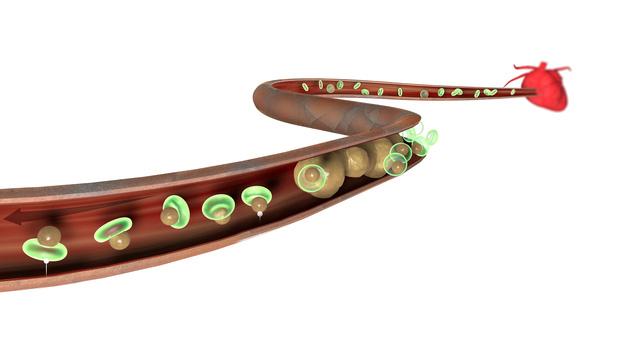ATLANTA, Nov. 13, 2018 /PRNewswire/ -- Global Genomics Group (G3), a leading precision-medicine based biopharmaceutical company presented novel, compelling data on the exact size of circulating lipoprotein (a) [Lp(a)] particles that cause plaque buildup in the coronary arteries feeding the heart muscle at the Annual Scientific Sessions of the American Heart Association in Chicago, IL on November 12, 2018. It is well known that lipoprotein particles, such as LDL particles ("bad cholesterol"), cause plaque buildup and ultimately lead to sudden cardiac death, heart attacks and stroke. Lp(a) is a less-well known lipoprotein particle with some features like LDL particles, but also, with some distinct differences.
Utilizing data from its prospective, international, multi-center GLOBAL clinical study (Genetic Loci and the Burden of Atherosclerotic Lesions; NCT01738828), investigators utilized very precise assessment and measurements of coronary arterial plaque based on comprehensive cardiovascular computed tomography (CT), coupled with sophisticated measurements of different sizes of Lp(a) particles from the study participants. The size of circulating Lp(a) particles is determined by the number of a repeating segment of one of the protein components (kringle IV type 2 repeats), typically ranging from 15 to up to 40 repeats. Based on G3's proprietary data, investigators concluded that small Lp(a) particles, those with 24 kringle repeats or less, but not the larger Lp(a) particles were associated with plaque buildup in the coronary arteries.
"This is significantly new information and adds to the literature with regards to Lp(a) particles and their contribution to heart disease", said Szilard Voros, MD, FACC, FSCCT, FAHA; senior investigator of the study, and Founder and Chief Executive Officer of G3. "Lowering of bad cholesterol, or 'LDL-cholesterol,' remains the focal point of treating and preventing cardiovascular disease. However, a significant proportion of patient who are aggressively treated with new LDL-lowering therapies such as statins and PCSK9 inhibitors still suffer sudden cardiac death, heart attacks and strokes. We were uniquely well-positioned to unravel the relevant size range of Lp(a) particles, as our platform is composed of precision imaging of the heart, and we had precise measurements of Lp(a) size in our patients. Lowering circulating Lp(a) levels has recently become a potential novel target for lipoprotein modification for the treatment and prevention of cardiovascular disease. Understanding precise mechanisms, such as the size of harmful Lp(a) particles, is of utmost importance as we move ahead with evaluating novel Lp(a) lowering therapies for the prevention and treatment of cardiovascular disease."
About Global Genomics Group (G3)
G3 is the leading precision-medicine-based biopharmaceutical company, developing genetically validated drug targets and novel biomarkers based on biological Big Data, using novel artificial intelligence and machine-learning algorithms and traditional systems-biology-driven bioinformatics approaches to unravel new biologies of common, chronic diseases and rare diseases. G3 combines precision phenotyping with pan-omics (genomics, epigenomics, transcriptomics, proteomics, metabolomics, lipidomics and lipoprotein proteomics) and systems-biology driven bioinformatics to investigate the development and progression of common chronic diseases, as well as rare and orphan diseases.
Read the full article here: https://www.prnewswire.com/news-releases/global-genomics-group-g3-presents-data-for-the-first-time-on-the-exact-size-of-lipoprotein-a-particles-that-cause-plaque-buildup-in-coronary-arteries-from-its-global-clinical-study-platform-300749034.html
